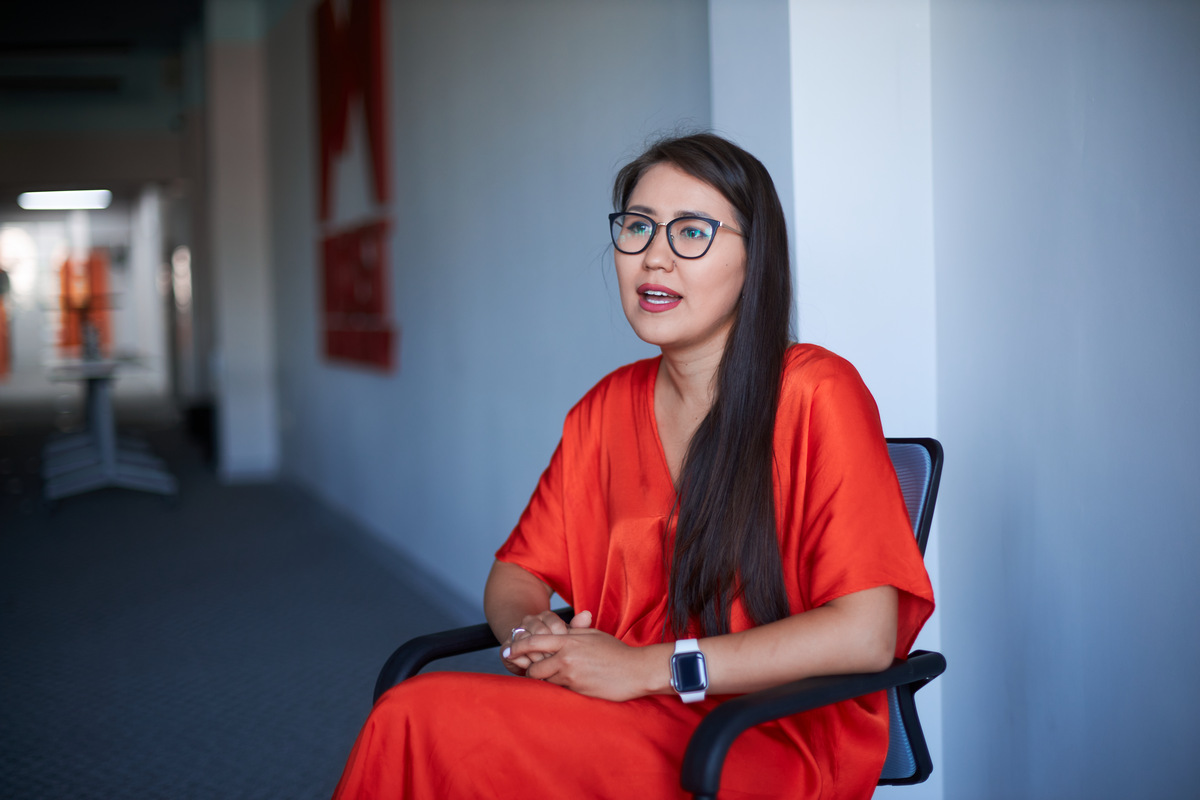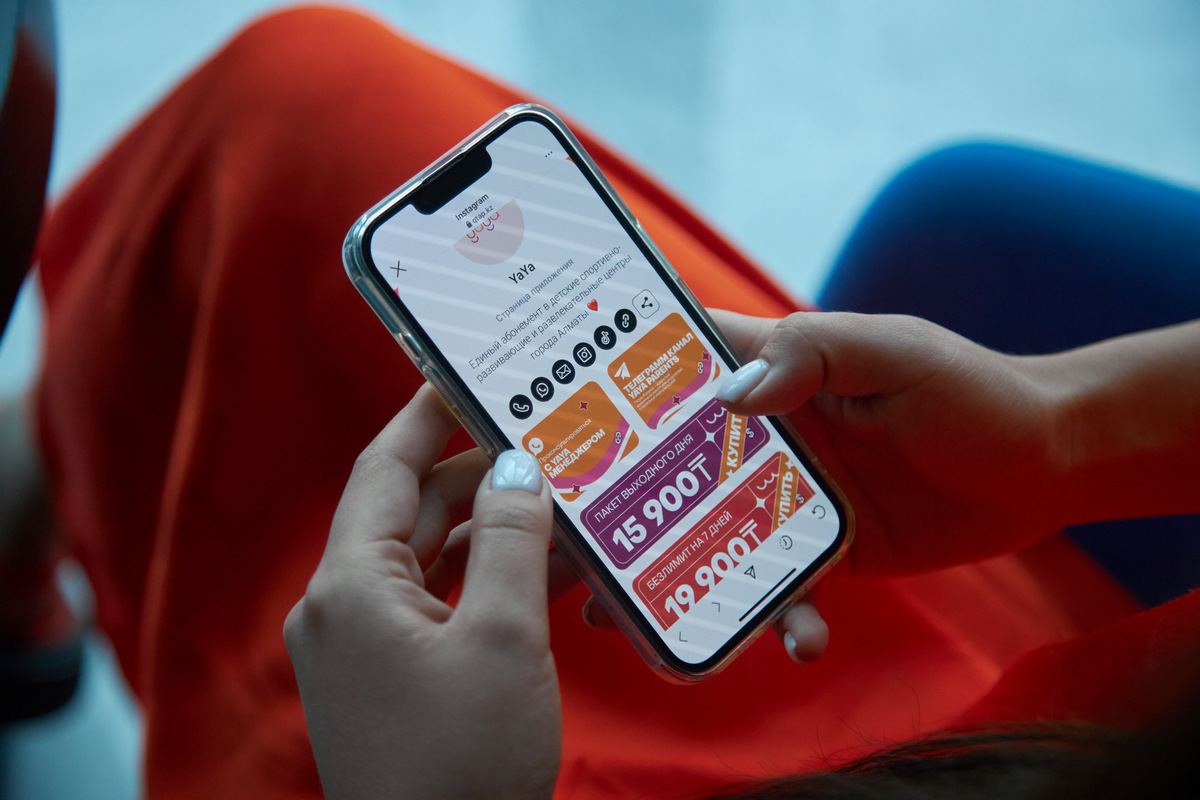While on maternity leave, Laura conceived the notion of establishing a platform dedicated to locating nannies, thus giving rise to the YAYA project. Relatively recently, the project underwent a pivotal transformation. Presently, it has evolved into an encompassing membership card that grants access to children’s amusement centers and educational workshops.
Collaborating on the “100 Startup Stories of Kazakhstan” initiative by Digital Business and Astana Hub, the young mother disclosed her vision for the future of the nanny search service, elucidated the rationale behind the team’s decision to move away from a profitable model, and expounded on the value that the service brings to both parents and businesses.
“Following a year of maternity leave, I found myself brimming with energy that I was eager to channel into self-development”
– What did you do after leaving Choco?
– Invited by Rada Islamova, the former director of Lensmark (an online contact lens store under the Chocofamily holding), I became a part of the IT community Wonder Women. This was a pivotal experience where I gained insights into formulating strategies, crafting business plans, team assembly, and more.

Afterward, a maternity leave of around a year ensued, during which I found myself amassing considerable energy. Eager to channel this energy into self-fulfillment, I embarked on a quest for a nanny for my child. The complexity of finding a qualified nanny struck me, and discussions with friends revealed that they also grappled with similar challenges. This issue resonated widely. Consequently, in collaboration with a friend from my Chinese studies, we resolved to establish a platform for nanny searches. Our team expanded as Zhansaya Nugusbek joined us as a founder and CTO.
Our journey led us to apply for the 4traction bootcamp, orchestrated by Gennadiy Kim, a prominent figure within Choco’s leadership. This bootcamp was designed to assist in launching startups from the ground up, and it was during this program that our idea began to take tangible form.
– What was the result?
– The platform addresses three primary objectives: locating, vetting, and facilitating connections. Our responsibilities encompassed the search for nannies and a methodical assessment of their skills, experience, psychological well-being, and emotional state. This included reviewing feedback from previous employers and various other considerations. By incorporating video interviews and establishing a candidate search function based on specific criteria, we catered to both parents and nannies.
In essence, we developed a website where parents and nannies could submit their requests. The system then scrutinizes the information provided and suggests the most fitting matches to each party involved.

– The main focus of YAYA is to establish connections between nannies and parents. However, another crucial aspect that you highlighted in prior interviews is the emphasis on training…
– Exactly, the core challenge lies in locating a premium nanny, a rarity within the market. A significant portion of those in this profession view it as a temporary role. Hence, we concluded that integrating training into the platform is imperative. We collaborated with educators, psychologists, and other experts to develop a comprehensive program. To date, more than 200 nannies have completed training through this initiative.
– What amount of funding was necessary to execute the entire implementation?
– Roughly 3-4 million tenge was invested to initiate the website along with an integrated Telegram community chatbot, coupled with a marketing campaign. These funds were entirely sourced from the founders themselves.
Fortuitously, the project proved profitable right from its inaugural month of operation. Upon agreement between nannies and parents, a predetermined one-time fee was collected from both sides. Occasionally, the venture even generated operational profits.
“The nannies service doesn’t resemble a typical venture; instead, our model is more akin to that of a digital agency”
– Several months into YAYA platform’s operations, it expanded to provide babysitting services. What sets babysitters apart from nannies?
– A babysitter is an individual without formal training who can care for a baby for a few hours a day. This responsibility can be undertaken by a broader range of individuals compared to the role of a nanny. Anyone aged 18 or older can assume the role of a babysitter. It’s akin to enlisting your sister or a friend to watch over your child in your absence.

– Why did you need this service?
– We observed a significant challenge with retaining nannies. Once the nanny’s agreement with parents is established, she tends to be lost due to the extended contract terms. Concurrently, our operational responsibilities encompass various tasks related to search, verification, and facilitation.
To address this, we initiated experimentation with babysitters. Their availability is higher, and their prerequisites are less stringent. To monetize this, we introduced a subscription model. Parents pay 30,000 tenges and gain access to the babysitter database, usable for up to 30 times each month. Theparents, however, pay to the babysitters themselves.
Our progress was encouraging, with consistent growth month by month. Babysitting services notably gained traction, especially among parents aged 35 and above in Almaty.

– What prompted your decision to pivot?
– The nannies service doesn’t conform to the conventional venture model; instead, our approach more closely resembles that of a digital agency. We locate individuals, conduct assessments, offer training when needed, establish connections with parents, and that essentially sums up the process. Subsequently, the cycle repeats.
In this setup, a rise in client numbers corresponds to a proportional upsurge in operational tasks. While our profits are substantial, scaling becomes intricate. Nevertheless, our identity is that of a technology-focused startup with ambitions for swift growth and expansion into new markets.
However, the process is smoother with babysitters, even though the market in Kazakhstan isn’t entirely prepared for such a model. The majority of individuals require education about the value, and achieving this without substantial financial investments presents a challenge.

However, the primary objective was for YAYA to become an all-encompassing ecosystem for parents. Currently, there isn’t a platform in Kazakhstan that consolidates all essential services in a single location. This particular market segment holds significant promise and is on an upward trajectory. On average, a family in Kazakhstan has three children.
The babysitters service emerged as an organic startup. It played a pivotal role in uniting the audience, gauging demand, and establishing our reputation. Around mid-June, we shifted our focus from day-to-day operations to the systematic testing of several hypotheses we had formulated over the six months of engaging with parents.
We’ve temporarily suspended the babysitters and nannies service until more opportune circumstances arise. This isn’t a rejection but a transformation to introduce it anew in a different format.
“We opted to assess if the 1Fit model could be effective in a different sphere”
– Is the idea behind the YAYA pass, a single membership card granting access to children’s amusement centers and educational workshops, closely aligned with the 1Fit concept? Did you adapt their idea?
– I cannot hide that we drew inspiration from the achievements of 1Fit. They managed to craft a distinctive case for our market by instilling a culture of monthly and yearly single membership purchases. It set a remarkable precedent. Consequently, we opted to test if such a model could be successful in a different domain.
As per 2GIS data, Almaty alone boasts more than a thousand children’s amusement centers. Additionally, there are diverse creative workshops, sports classes, and other offerings. This constitutes a substantial market that is still untapped.

– In a Digital Business interview last year, 1Fit CEO Murat Alikhanov revealed that initially, they faced difficulties in conveying their value proposition to fitness centers. Did you encounter a similar challenge?
– This might sound remarkable, but every center we approached for collaboration embraced the idea. Within the first week, we secured 15 partners, even though our product wasn’t fully operational at that point.
Presently, substantiating value to the centers is aided by my prior experience at Rahmet. There, I was also involved in elucidating the advantages of automating and digitizing specific processes to our partners.
– What benefits will the membership card service bring to them?
– This industry is largely lacking in digitalization. Numerous staff members in such centers still manually record visitor surnames on paper, and subsequently (in optimal scenarios) input this data into Excel. Consequently, they lack a comprehensive understanding of their clientele, the frequently availed services, and the expenditure patterns. The absence of such information makes formulating strategies for acquiring new clients and re-engaging past ones challenging. Through our assistance, they would gain access to all essential data.
Furthermore, we provide our partners with an extra marketing tool to enhance visitor turnout during off-peak hours. Through the operation of our nanny service, we have amassed a database of parents who can be presented with various engaging options for their children.
– How to attract them?
– We convey multiple values to parents, with the foremost being cost savings. Instead of disbursing, for instance, 10 thousand tenge for a bouncy house, 30 thousand tenge for a creative studio, and 40 thousand tenge for robotics engineering and sports classes, they can acquire our monthly subscription card and freely access any desired option.
The second value we provide is assisting parents in crafting weekend or holiday programs for their children. We present an array of diverse venues for enjoyment, and handle all the bookings and related operational tasks.

The third value stems from our intention to introduce professional orientation expertise. The system will suggest classes that aim to further uncover a child’s talents.
“The longer the membership card duration, the greater the likelihood that it won’t be utilized to its full extent”
– Where do your profits come from in this model?
– The operational model functions in the following manner: we establish agreements with partners to provide services at a special rate for our users. In essence, parents purchase our membership card, enabling them to take their child to any venue of their choice throughout the month. Subsequently, we cover the costs. If the card isn’t used to its maximum capacity, we retain the remaining balance.
– What happens if a user surpasses 50 thousand tenge?
– Initially, we intended to establish limits to avoid potential losses. Nevertheless, we swiftly received user complaints regarding the numerous limitations. Consequently, we opted to eliminate the limits and cover expenses from our own resources if a user surpasses the membership card’s cost. However, we’re currently in the process of developing a revised limits model that ensures user convenience while also being advantageous for us.
– Do you have any concerns regarding the possibility of facing a cash shortage?
– Certainly, risks are inherent in any business endeavor. This is particularly true as we are pioneering a novel pattern. Consequently, we’re currently experimenting with various new hypotheses to determine which one proves to be the most effective.
Similar services in various markets have demonstrated that generating revenue solely from weekly and monthly memberships can be challenging. However, this isn’t our primary objective at the moment. What holds significance is gauging the demand for semi-annual or annual memberships, which offer a higher margin, after individuals have experienced the monthly option.
Statistics reveal that the likelihood of a person not fully utilizing their membership increases with its longer duration. This assertion is supported by center owners, where 8 out of 10 inner membership card holders do not exhaust their benefits completely. This can be attributed to factors such as children falling ill or spending time with grandparents, particularly during the summer months.
Nonetheless, I am open to the possibility of evolving our model over time and incorporating a revenue stream from our partners, a step we are currently not taking.

– From where are you currently sourcing funds?
– We are utilizing our personal funds for investment. The project currently comprises four founders: myself, Zhansaya Nugusbek, Enlik Tlepova, and Meruert Kapalbek. Furthermore, we are actively engaged in the process of securing a round of funding. Our aim is to raise $200 thousand, which is essential for establishing a foothold in the domestic market, refining product-market fit, and enabling scalability. We are currently fine-tuning the MVP on Qtap.
We’ve established positive connections with investors. Our project is currently valued at $1.5 million. We are presently participating in the Investment Readiness Accelerator (IRA) program at MOST Hub. I anticipate that following this program, our estimated value will rise further.
– Have you considered plans for scaling?
– We intend to expand into markets that align with our essential criteria: a stable economy, a growing birth rate, and the presence of financial installments. Our primary scaling focus lies in the UAE, particularly due to its significant parental capital. Furthermore, we hold a keen interest in SouthEast Asia and the USA.
– Considering that you are developing an ecosystem, what is your vision for the final product?
– In an ideal scenario, it becomes a platform encompassing parent training programs, a range of services like nanny searches, children’s product sales, and more. We envision it as a compelling case with substantial long-term value (LTV), ensuring that children grow up with YAYA.
Our main objective currently is refining the product – centering on parents’ needs and comprehending their requirements. Grounded in this understanding, we will construct the ecosystem. Moreover, I have a strong belief that our actions are impeccably timed.

While on maternity leave, Laura conceived the notion of establishing a platform dedicated to locating nannies, thus giving rise to the YAYA project. Relatively recently, the project underwent a pivotal transformation. Presently, it has evolved into an encompassing membership card that grants access to children’s amusement centers and educational workshops.
Collaborating on the “100 Startup Stories of Kazakhstan” initiative by Digital Business and Astana Hub, the young mother disclosed her vision for the future of the nanny search service, elucidated the rationale behind the team’s decision to move away from a profitable model, and expounded on the value that the service brings to both parents and businesses.
“Following a year of maternity leave, I found myself brimming with energy that I was eager to channel into self-development”
– What did you do after leaving Choco?
– Invited by Rada Islamova, the former director of Lensmark (an online contact lens store under the Chocofamily holding), I became a part of the IT community Wonder Women. This was a pivotal experience where I gained insights into formulating strategies, crafting business plans, team assembly, and more.

Afterward, a maternity leave of around a year ensued, during which I found myself amassing considerable energy. Eager to channel this energy into self-fulfillment, I embarked on a quest for a nanny for my child. The complexity of finding a qualified nanny struck me, and discussions with friends revealed that they also grappled with similar challenges. This issue resonated widely. Consequently, in collaboration with a friend from my Chinese studies, we resolved to establish a platform for nanny searches. Our team expanded as Zhansaya Nugusbek joined us as a founder and CTO.
Our journey led us to apply for the 4traction bootcamp, orchestrated by Gennadiy Kim, a prominent figure within Choco’s leadership. This bootcamp was designed to assist in launching startups from the ground up, and it was during this program that our idea began to take tangible form.
– What was the result?
– The platform addresses three primary objectives: locating, vetting, and facilitating connections. Our responsibilities encompassed the search for nannies and a methodical assessment of their skills, experience, psychological well-being, and emotional state. This included reviewing feedback from previous employers and various other considerations. By incorporating video interviews and establishing a candidate search function based on specific criteria, we catered to both parents and nannies.
In essence, we developed a website where parents and nannies could submit their requests. The system then scrutinizes the information provided and suggests the most fitting matches to each party involved.

– The main focus of YAYA is to establish connections between nannies and parents. However, another crucial aspect that you highlighted in prior interviews is the emphasis on training…
– Exactly, the core challenge lies in locating a premium nanny, a rarity within the market. A significant portion of those in this profession view it as a temporary role. Hence, we concluded that integrating training into the platform is imperative. We collaborated with educators, psychologists, and other experts to develop a comprehensive program. To date, more than 200 nannies have completed training through this initiative.
– What amount of funding was necessary to execute the entire implementation?
– Roughly 3-4 million tenge was invested to initiate the website along with an integrated Telegram community chatbot, coupled with a marketing campaign. These funds were entirely sourced from the founders themselves.
Fortuitously, the project proved profitable right from its inaugural month of operation. Upon agreement between nannies and parents, a predetermined one-time fee was collected from both sides. Occasionally, the venture even generated operational profits.
“The nannies service doesn’t resemble a typical venture; instead, our model is more akin to that of a digital agency”
– Several months into YAYA platform’s operations, it expanded to provide babysitting services. What sets babysitters apart from nannies?
– A babysitter is an individual without formal training who can care for a baby for a few hours a day. This responsibility can be undertaken by a broader range of individuals compared to the role of a nanny. Anyone aged 18 or older can assume the role of a babysitter. It’s akin to enlisting your sister or a friend to watch over your child in your absence.

– Why did you need this service?
– We observed a significant challenge with retaining nannies. Once the nanny’s agreement with parents is established, she tends to be lost due to the extended contract terms. Concurrently, our operational responsibilities encompass various tasks related to search, verification, and facilitation.
To address this, we initiated experimentation with babysitters. Their availability is higher, and their prerequisites are less stringent. To monetize this, we introduced a subscription model. Parents pay 30,000 tenges and gain access to the babysitter database, usable for up to 30 times each month. Theparents, however, pay to the babysitters themselves.
Our progress was encouraging, with consistent growth month by month. Babysitting services notably gained traction, especially among parents aged 35 and above in Almaty.

– What prompted your decision to pivot?
– The nannies service doesn’t conform to the conventional venture model; instead, our approach more closely resembles that of a digital agency. We locate individuals, conduct assessments, offer training when needed, establish connections with parents, and that essentially sums up the process. Subsequently, the cycle repeats.
In this setup, a rise in client numbers corresponds to a proportional upsurge in operational tasks. While our profits are substantial, scaling becomes intricate. Nevertheless, our identity is that of a technology-focused startup with ambitions for swift growth and expansion into new markets.
However, the process is smoother with babysitters, even though the market in Kazakhstan isn’t entirely prepared for such a model. The majority of individuals require education about the value, and achieving this without substantial financial investments presents a challenge.

However, the primary objective was for YAYA to become an all-encompassing ecosystem for parents. Currently, there isn’t a platform in Kazakhstan that consolidates all essential services in a single location. This particular market segment holds significant promise and is on an upward trajectory. On average, a family in Kazakhstan has three children.
The babysitters service emerged as an organic startup. It played a pivotal role in uniting the audience, gauging demand, and establishing our reputation. Around mid-June, we shifted our focus from day-to-day operations to the systematic testing of several hypotheses we had formulated over the six months of engaging with parents.
We’ve temporarily suspended the babysitters and nannies service until more opportune circumstances arise. This isn’t a rejection but a transformation to introduce it anew in a different format.
“We opted to assess if the 1Fit model could be effective in a different sphere”
– Is the idea behind the YAYA pass, a single membership card granting access to children’s amusement centers and educational workshops, closely aligned with the 1Fit concept? Did you adapt their idea?
– I cannot hide that we drew inspiration from the achievements of 1Fit. They managed to craft a distinctive case for our market by instilling a culture of monthly and yearly single membership purchases. It set a remarkable precedent. Consequently, we opted to test if such a model could be successful in a different domain.
As per 2GIS data, Almaty alone boasts more than a thousand children’s amusement centers. Additionally, there are diverse creative workshops, sports classes, and other offerings. This constitutes a substantial market that is still untapped.

– In a Digital Business interview last year, 1Fit CEO Murat Alikhanov revealed that initially, they faced difficulties in conveying their value proposition to fitness centers. Did you encounter a similar challenge?
– This might sound remarkable, but every center we approached for collaboration embraced the idea. Within the first week, we secured 15 partners, even though our product wasn’t fully operational at that point.
Presently, substantiating value to the centers is aided by my prior experience at Rahmet. There, I was also involved in elucidating the advantages of automating and digitizing specific processes to our partners.
– What benefits will the membership card service bring to them?
– This industry is largely lacking in digitalization. Numerous staff members in such centers still manually record visitor surnames on paper, and subsequently (in optimal scenarios) input this data into Excel. Consequently, they lack a comprehensive understanding of their clientele, the frequently availed services, and the expenditure patterns. The absence of such information makes formulating strategies for acquiring new clients and re-engaging past ones challenging. Through our assistance, they would gain access to all essential data.
Furthermore, we provide our partners with an extra marketing tool to enhance visitor turnout during off-peak hours. Through the operation of our nanny service, we have amassed a database of parents who can be presented with various engaging options for their children.
– How to attract them?
– We convey multiple values to parents, with the foremost being cost savings. Instead of disbursing, for instance, 10 thousand tenge for a bouncy house, 30 thousand tenge for a creative studio, and 40 thousand tenge for robotics engineering and sports classes, they can acquire our monthly subscription card and freely access any desired option.
The second value we provide is assisting parents in crafting weekend or holiday programs for their children. We present an array of diverse venues for enjoyment, and handle all the bookings and related operational tasks.

The third value stems from our intention to introduce professional orientation expertise. The system will suggest classes that aim to further uncover a child’s talents.
“The longer the membership card duration, the greater the likelihood that it won’t be utilized to its full extent”
– Where do your profits come from in this model?
– The operational model functions in the following manner: we establish agreements with partners to provide services at a special rate for our users. In essence, parents purchase our membership card, enabling them to take their child to any venue of their choice throughout the month. Subsequently, we cover the costs. If the card isn’t used to its maximum capacity, we retain the remaining balance.
– What happens if a user surpasses 50 thousand tenge?
– Initially, we intended to establish limits to avoid potential losses. Nevertheless, we swiftly received user complaints regarding the numerous limitations. Consequently, we opted to eliminate the limits and cover expenses from our own resources if a user surpasses the membership card’s cost. However, we’re currently in the process of developing a revised limits model that ensures user convenience while also being advantageous for us.
– Do you have any concerns regarding the possibility of facing a cash shortage?
– Certainly, risks are inherent in any business endeavor. This is particularly true as we are pioneering a novel pattern. Consequently, we’re currently experimenting with various new hypotheses to determine which one proves to be the most effective.
Similar services in various markets have demonstrated that generating revenue solely from weekly and monthly memberships can be challenging. However, this isn’t our primary objective at the moment. What holds significance is gauging the demand for semi-annual or annual memberships, which offer a higher margin, after individuals have experienced the monthly option.
Statistics reveal that the likelihood of a person not fully utilizing their membership increases with its longer duration. This assertion is supported by center owners, where 8 out of 10 inner membership card holders do not exhaust their benefits completely. This can be attributed to factors such as children falling ill or spending time with grandparents, particularly during the summer months.
Nonetheless, I am open to the possibility of evolving our model over time and incorporating a revenue stream from our partners, a step we are currently not taking.

– From where are you currently sourcing funds?
– We are utilizing our personal funds for investment. The project currently comprises four founders: myself, Zhansaya Nugusbek, Enlik Tlepova, and Meruert Kapalbek. Furthermore, we are actively engaged in the process of securing a round of funding. Our aim is to raise $200 thousand, which is essential for establishing a foothold in the domestic market, refining product-market fit, and enabling scalability. We are currently fine-tuning the MVP on Qtap.
We’ve established positive connections with investors. Our project is currently valued at $1.5 million. We are presently participating in the Investment Readiness Accelerator (IRA) program at MOST Hub. I anticipate that following this program, our estimated value will rise further.
– Have you considered plans for scaling?
– We intend to expand into markets that align with our essential criteria: a stable economy, a growing birth rate, and the presence of financial installments. Our primary scaling focus lies in the UAE, particularly due to its significant parental capital. Furthermore, we hold a keen interest in SouthEast Asia and the USA.
– Considering that you are developing an ecosystem, what is your vision for the final product?
– In an ideal scenario, it becomes a platform encompassing parent training programs, a range of services like nanny searches, children’s product sales, and more. We envision it as a compelling case with substantial long-term value (LTV), ensuring that children grow up with YAYA.
Our main objective currently is refining the product – centering on parents’ needs and comprehending their requirements. Grounded in this understanding, we will construct the ecosystem. Moreover, I have a strong belief that our actions are impeccably timed.







